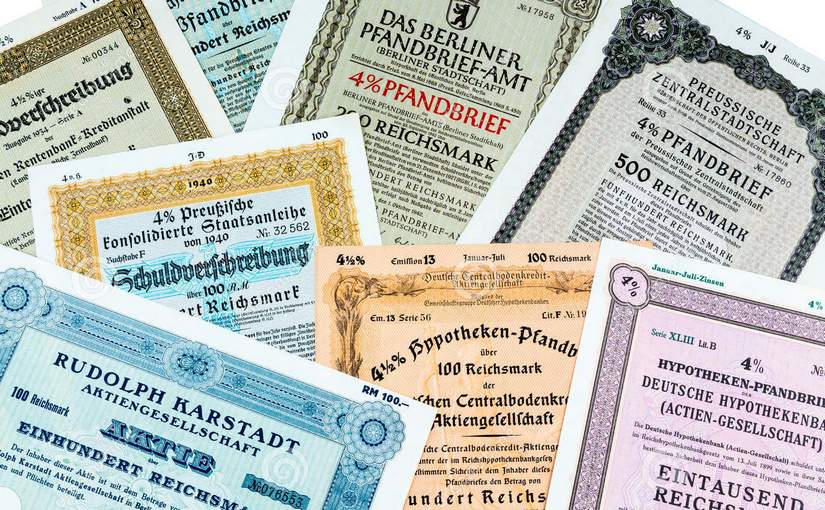What are bonds in simple words?

Bond causes many people to associate an old sofa, smelling of mothballs, which was taken out of the closet of the great-grandmother. Modern people have begun to take an interest in these debt securities. Some people just want to satisfy their curiosity, while others think to make real money on them. To understand the essence of bonds, you need to understand this foreign term, in particular, where it came from in the Russian language. How to interpret a bond in simple terms?
The term bond has Latin roots, in translation it means “oblige” and denotes public obligations, the repayment of which is carried out by lot. What is a bond in simple terms?
At the time of the Russian Empire, bonds of trusts and concerns were in circulation. These securities were characterized by several degrees of protection. As a rule, they were used in various transactions.
The definition of “bond” was found in one of the oldest dictionaries of foreign words that have entered the Russian language. In the 1910 edition, a bond is, in simple terms, a promissory note that is printed or written by public or private companies. If you make a direct translation of the word, then a bond is in simple words a government loan ticket.
If we talk about a bond from a financial point of view, then the following definition arises: “A bond is a security that secures for its owner the right to recover from the issuer the nominal value of the security or the property equivalent within the established period, as well as to receive a fixed remuneration in the form of a percentage of the nominal value or other equivalent property rights.” What is a bond in simple words and how profitable it is to buy them, we told in this article.
A bond is a type of security that proves that its owner actually lent money to the organization that issued and sold the security. Moreover, this lucky person claims not only the invested amount, but also interest for using his money.

To be honest, in reality, no one will be able to swing bonds now, due to the fact that most securities are issued in electronic format. Bonds are no exception.
When buying a bond, a modern investor is not handed a stamped paper that is stitched with gold threads. At the exchange, information about the new holder is entered in the register, and interest is automatically credited to their account.
Thus, based on the above definitions, bonds are simply promissory notes that must be repaid together with interest after some time. The owner of the receipt can do with it as he pleases. This means that they can sell it, transfer it, and so on. Regardless of the financial transactions performed, the value of the bond does not change. The borrower does not care to whom he has to pay the debt with interest, in other words, the identity of the bearer does not play any role.
All about bonds
Many readers will want to know for what purpose issuers issue these securities, as well as the reason why people buy them.
Such operations, we practice in our lives regularly, without even knowing it. For example, a neighbor lent a can of coffee to paycheck, and when paying back the debt, she invites you to a cup of fragrant drink with a pie. You are not in a bad situation, and you were able to make a lot of money.
In some cases, people provide financial assistance to friends and acquaintances. For example, you gave a friend money to start his own business with the condition that he will return it with interest in 1-2 years, when his business starts to make a profit. But there is another version of the agreement, according to which the future businessman can become your employer or make you a co-owner of the enterprise.
Similar life examples occur in the relationships of individuals. How, then, do you build financial relationships with commercial companies? Let’s take a look at the facts.
Almost every person took out a loan from a commercial bank. Perhaps it was a mortgage, a loan to buy a car, opening a credit card with 0 percent. When we get a loan from a bank, we become borrowers. But you can also switch roles, an individual today may well become a lender for a joint-stock company, bank, or enterprise. In this case, they will pay him interest for it. Such services are usually not advertised, but they are present in practice.

Recently, the public has shown interest in bonds. This interest is explained by the fact that the Ministry of Finance has issued people’s bonds, which anyone can buy. The income on them is higher than what bank deposits can give. People consider this option as an alternative to deposits.
In fact, you can earn income on securities that exceeds the rate on classic deposits. However, not everyone clearly understands what bonds are. Bond parameters, unlike bank deposits, have some features that affect the final yield of the security.
It is not easy for a novice to understand all this variety of opportunities, because he will have to choose from several hundred options for securities, and you also need to know where to buy them.
Bond Parameters
The issuer produces bonds in order to raise funds. In many cases, this method of raising money is cheaper than a loan, and it also allows you to quickly collect the necessary amount. In other words, the purchase of bonds is a loan to the issuer for a certain period of time and at a fixed fee.
The parameters of bank deposits are known to many borrowers. These include the deposit term, interest, the ability to deposit and withdraw funds, and the minimum and maximum deposit amount. Debt securities, unlike deposits, have a broader list of parameters. These include the nominal value, market price, term of circulation, type, frequency of payments, yield, coupon, duration, offer, and credit rating.
Each bond has a face value or face value that will be constant for the entire period of circulation. The face value of the bonds, which are traded on the Russian stock exchange, is $ 14.
The face value of the bond is the body of the deposit. The value of the bonds may change over time. For example, if the demand for them increases, then their cost will rise accordingly. Such bonds can easily be sold for 10-20% more than the face value. But it may be different. In case of unfavorable circumstances, the value of the bonds on the market may be lower than the nominal value. The bond is redeemed at face value. Regardless of the price at which you purchase the bond, at the end of its circulation period, the issuer must pay you an amount that will be equivalent to the face value of the security.
Market price refers to the current value of a security. In simpler words, this is the price at which you can sell it now, without waiting for the end of its circulation period. The price on the market can be higher or lower than the nominal value, depending on the supply and demand that have formed on the market at the current date.
All bonds have their own term of circulation, that is, they have a limited period of validity. It can be 1, 5, 10, 20, 30 years. All this time, the owner receives coupon income. The nominal value will be returned after the maturity of the debt paper.

According to the form of payment of income, bonds can be either discount or coupon. Discount bonds are placed on the exchange at a value that is lower than par, and repayment occurs at par. The difference between these two prices and form the income of the depositor. For example, a company sold bonds for $ 11, while it has a face value of $ 14, and at the time of repayment, the investor will receive a profit of $ 3 from each bond. It turns out that the bonds have a yield of 25%.
Coupon bonds imply the payment of a coupon. A bond coupon is a fixed interest rate. The frequency of payments may vary: a quarter, six months, or a year. Coupon income accruals every day, but the payment will be made at the time specified by the issuer. For example, the nominal value of a share is $ 14, it has a coupon yield of 12% per annum, and payments on them will be made 2 times a year. This means that every 6 months, you will receive 6% of the nominal value-0.84 cents.
The interest on a coupon bond that is not paid to the investor is called accumulated coupon income. It adds to the price of the bond and makes it correspondingly more expensive. When the percentage is paid, the coupon is reset to zero and begins to “collect” again on the account. If you decide to sell the bond before the due date, the buyer must pay not only the face value, but also the accumulated coupon income. Thus, the owner will not lose accrued income and will maintain high liquidity of the debt security on the market.
What is the yield of OFZs to maturity?
The bond yield may be:
- nominal or coupon value;
- to be repaid.
In the first variant, the current yield of OFZ is calculated from the amount of profit that the owner receives on coupon payments. For example, if the payout occurs once a year and is $ 1.67 with a face value of $ 13.92, the yield is 12% per annum.
However, the market price differs from the nominal value. Therefore, experts advise you to give preference to the second option, since this parameter shows how much profit you will have from each invested cent. How to understand?
If the coupon is equal to 12% of the face value and is $ 1.67, and the market price is fixed at $ 15.31, then buying them at this value, the yield to maturity decreases, since you invest $ 1.39 more.1.67 dollars with an investment of 15.31 dollars gives a real return of 10.9% per annum.
Today, there is a guaranteed opportunity to get an additional 13% profit from the purchase of a bond, not counting coupon income.
There are 2 types of yield to maturity:
- simple;
- effective.
Debt securities can be:
- state-owned companies;
- municipal services;
- corporate clients;
- eurobonds.
The Government is the issuer of government debt securities. In Russia, such bonds are also called OFZs. The issue is initiated by the Ministry of Finance.
Municipal securities are issued by local authorities. These can be bonds issued in the Tomsk Region, Leningrad Region, etc.
Corporate securities are issued by commercial entities. This can be Sberbank or Alfa bonds.
The Eurobonds are denominated in a foreign currency. Due to the fact that one lot has an unaffordable cost for private investors, which starts from 100 thousand dollars, they are practically not interested in them.

Federal loan bonds are considered the most popular debt securities on the Russian market. The circulation period is 1-30 years, the nominal value is $ 13.92. They differ in coupon income.
Types of bond coupons:
- pd bonds (constant income);
- OFZ fixed coupon;
- OFZ indexed face value;
- OFZ debt amortization.
Bond yields depend directly on the risks involved. The higher the reliability of a debt security, the less income it brings to its owner. OFZs are considered the most reliable securities, and the state is their guarantor. They are followed by municipal bonds, and then corporate bonds. The most profitable ones are considered to be the last ones. The issuer’s credit rating also affects profitability.
For government bonds with constant income, you can calculate the profit. The coupon rate is fixed for the entire term of circulation, and the sale price of OFZ directly depends on the auction. In 2021, several OFZs-PD were issued in circulation, the interest on them ranged from 7-8. 14% per annum from par. If you look at the ofz yield chart, you can see that the current rates on them have significantly decreased compared to previous issues.
Practice shows that it is extremely unprofitable to buy short OFZs-PD, since the rate will be in constant decline, the best option is to fix it and buy long bonds.
When interest rates are lowered in the economy, the market value of debt securities begins to rise. This is a convenient time to sell, you can sell the security at a price that is higher than the face value. If you believe the forecasts of the Central Bank of Russia, the main rate on OFZs will drop to 6.5% in the near future, which gives prospects for long-term bonds. In the event that the inflation index increases contrary to forecasts, the coupon income or part of it will be absorbed by a decrease in the purchasing power of finance.
Permanent coupon bonds – is it?
There are many types of debt securities traded on the stock market. As a rule, they are issued in order to attract a large number of investors who have different interests and act according to their strategy.
A permanent coupon bond is a type of security that entitles you to receive regular cash payments during the entire term of its circulation and upon maturity. The coupon rate is announced at the time of issue and is retained for the entire circulation period.
For example, if the issuer issues a $ 13.92 bond for a 4-year term with an annual coupon rate of 5% of the face value, the company will pay depositors 0.70 cents for each bond for the year. On the day of the bond’s maturity, the company is obliged to pay the last coupon payment and return the nominal value of the share.

The coupon interest rate on government bonds may differ from that indicated in corporate securities.
Advantages of Permanent coupon bonds:
- the state is the guarantor;
- the yield is higher than the interest on bank deposits;
- liquidity;
- reinvesting coupon income;
- low entry threshold;
- transfer of securities by inheritance.
The disadvantages of investing in coupon securities include::
- low returns compared to stocks;
- additional costs;
- inflation.
On the Moscow Stock Exchange, you can find the following types of bonds: OFZ 26216 coupon, Kamaz-12-bob, OFZ-26205, etc. In addition, the exchange has information about the quotes of OFZ bonds, Gazprom bonds quotes, etc.
How to buy bonds at face value?
A private investor will be able to buy a bond only after entering into an agreement with a broker that will give him access to the stock market, where securities are traded.
The purchase process is as follows:
- signing an agreement with a broker;
- adding funds to your account;
- purchase of a security.
The State withholds a tax of 13% on bond income. Taxation covers coupon payments and the exchange rate difference between the purchase and sale of a debt obligation. For example, the issuer credited $ 1.39 of income to your account, and the state will take 0.18 cents. And so it will be every time you receive payments on debt securities. The same pattern occurs with the exchange rate difference. Let’s say you purchased a bond at $ 13.92, sold it a year later at $ 16.70, made a profit of $ 2.78, and you need to pay 0.36 cents to the state treasury. The coupon income tax is not levied only on OFZs.
Due to the fact that the broker is a tax agent, taxes will be deducted automatically when the coupon money is transferred to your account. In all other cases, the amount of taxes is calculated at the end of the year from the total profit received for the entire period.
All information on the current parameters of the bond on the market can be found in the trading terminal. After signing an agreement with a broker, you get access to the stock exchange. The program provides a convenient search system for bonds by yield, current value, maturity, etc.
If you are a beginner and would like to start your way in investing, then pay attention to the proven methods that we have described here.













Leave a Reply